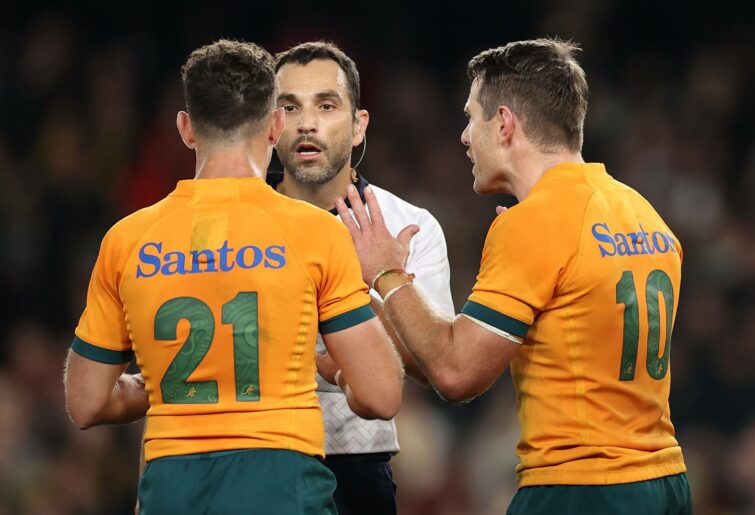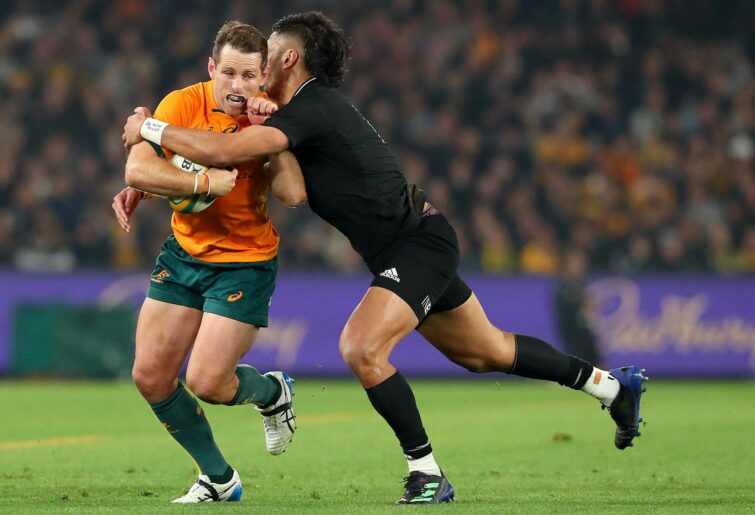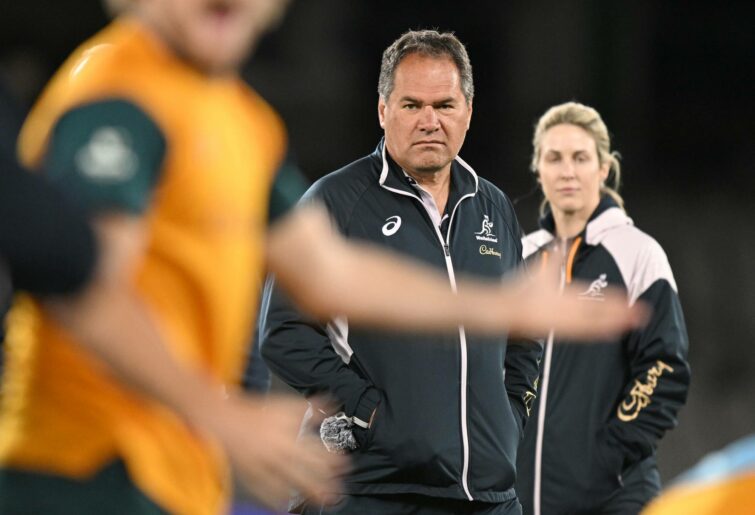It was almost as if Rugby Australia Chairman Hamish McLennan had wind of something special happening, endorsing coach Dave Rennie through until next year’s Rugby World Cup, during an afternoon sponsor announcement ahead of the Bledisloe Cup match at Marvel Stadium.
Either the Wallabies were going to be hammered and McLennan was pre-emptively circling the wagons around his man, or they were about to eke out a famous victory, and Rennie was in the throes of being handed the Wallabies coaching job for life.
In what was a crazy match, one that after a stuttering first half, rose from the dead and grabbed everyone by the throat, both of those things nearly happened.
Even so, no-one; not McLennan, not fans of both sides, not students of the most obscure French film and literature, could have been ready for what unfolded at the end of this dramatic match.
After 55 minutes, with a strong wind in their sails, the All Blacks had pushed out to 31-13 and things were looking decidedly bleak for the home side.
Just over 20 improbable minutes later, the Wallabies were ahead by 37-34 and within grasping distance of the elusive Bledisloe Cup.
That was without reckoning for the imprint – one much larger than rugby needs to see from its referees – of French referee Mathieu Raynal. In retrospect, given what had played out in front of them, none of the 53,000 in attendance could honestly say they were surprised that he would have a major say in the finish.
Let’s get that huge elephant out of the way first. Nobody wants referees to decide matches or to be the main talking point. But there are some occasions where that’s simply unavoidable.
As Rennie stressed post-match, this was a match that deserved savouring and examination because of the quality and closeness of the contest, not decisions made by the referee.
It’s a road All Blacks fans know too well; Gallic logic engulfing the end of the drawn 2017 Lions series, a chaotic and farcical situation from a kick-off which still rankles fans today. This time it was Australia’s turn, with Raynal’s decision to take the ball off Bernard Foley and turn a penalty to Australia into a scrum to New Zealand, a dagger into the heart of every Wallabies supporter.

Referee Mathieu Raynal (Photo by Cameron Spencer/Getty Images)
On this count, both coaches were right. Ian Foster took the situation in isolation and determined – accurately – the Foley was milking time, was given a hurry up by Raynal, and when Foley didn’t restart play as instructed, had the ball taken off him.
For his part, Rennie made the point – accurately – that rugby’s law book is too big for referees to go cherry picking and pluck out a call that nobody can remember ever being invoked before, and that referees, as well as adhering to the law book, should demonstrate feel for the game.
Raynal might argue that he did exactly that. Time-wasting is a scourge, and frustrated fans from all countries want it stamped out.
But to call it once? In the dying seconds of a tense match? Out of nowhere? That seems ridiculously penal.
It’s akin to penalising a halfback for a crooked feed once, at the end of a match, to decide the result, when both halfbacks had been doing it all match. All their life, even. Crazy stuff for which the solution really is quite simple; call it all the time or not at all.
The more charitable might say that Raynal had a confused night. But while Wallabies fans wake up this morning feeling angry and cheated, of the four main contentious calls he made – all of which did, or could have had an impact on the outcome – these fell two to each side.
Already sent off once this season, Darcy Swain will face an anxious wait to find out if his yellow card will be upgraded to red, after he was found to have attacked the leg of Quinn Tupaea.
At first, in real time, it didn’t look like much. But Tupaea likely faces nine months out of the game and, once the right replay was found, it became evident that Tupaea’s long rehabilitation will rest on Swain’s conscience.
Armed with that vision, it seemed inexplicable that Raynal would select only yellow.
Just as hard to understand, was Raynal’s decision to penalise Tyrel Lomax, and not issue a yellow card, for a lifting tackle in the second half. What everyone else saw was a grab between the legs, a lift beyond the horizontal, and a body slam into the turf.
Evening up the ledger was Andrew Kellaway’s first try, off a pop-pass from Bernard Foley that was propelled forward. And to be fair, sometimes these can be difficult for referees to pick up in the run of play.
But with input from upstairs, Raynal actually motioned to Foley to delay his conversion attempt, in order to have the play reviewed. He could sense something was awry.
Foley however, beat him to the punch, drilling the extras. Raynal looked uncertain. Was he now allowed to rule the conversion out and have the matter reviewed, or was it too late?
In the end, Raynal opted, reluctantly one felt, for, ‘whatever, let’s get on with it.’ Not good enough for a match of this stature.
Perhaps a true reflection of how out of synch Raynal was, was evidenced by his having to ask Jake Gordon three times if he was the No.9, before dispatching him to the sin bin. In all my time in rugby I’ve never known any referee, having stood next to a halfback at numerous scrums during a match, and listened to him chirp away, offering him advice at every turn, not to know who both halfbacks were.

Bernard Foley of the Wallabies is tackled by Rieko Ionae of the All Blacks (Photo by Kelly Defina/Getty Images)
When the dust settles and the emotion subsides, both sides will reflect on what were uneven performances; brilliant and highly satisfying in some parts, highly frustrating in others.
This was an unquestionably brave performance by the Wallabies, riven by multiple changes to their line-up. Legendary Melbourne Cup trainer Bart Cummings notably theorised that horses needed to have 10,000 racing metres in their legs in lead-up races, to ensure they had sufficient stamina to withstand the pressure of the Cup, run over two miles.
Twelve Melbourne Cups says Cummings knew what he was doing.
By contrast, Rennie has been able to get not much more than a couple of short-distance maiden races into some of his charges, including a playmaker stepping from an inferior competition, where he last strapped on a boot in anger three months ago, to the heat of a Bledisloe Cup match.
While it’s evident that the Wallabies under Rennie have been building depth, it was highly questionable whether their ability to do so has kept pace with the attrition rate.
Whether by accident or design, this performance should provide Rennie and Wallabies supporters with great heart, knowing that there is a broader base of players in the process of becoming true Test players.
Two of the changes proved to be master strokes. Despite a couple of defensive lapses, Foley was remarkably calm and assured and his distribution continually asked questions of the All Blacks. A most unlikely comeback, but a highly creditable one.
Flanker Pete Samu has been great value off the bench, but he will be hard to shift from the starting role after this effort; tireless in defence and a menace on the carry.
Other plusses were a scrum that, after one false start, had the better of things, a booming penalty kick under pressure from Nic White that suggested that this should be seen more often, and some clinical finishing in what was a highly impressive comeback.

Wallabies head coach Dave Rennie. (Photo by Morgan Hancock/Getty Images)
On the downside, having got back to 10-10, at the half hour the Wallabies had the All Blacks under enormous pressure on their line, only to falter, losing shape and organisation, and, eventually, the ball.
Seconds later, Caleb Clarke had carried 70 metres and Tom Wright and Darcy Swain were both in the bin. Big moments.
For their part, with a two-man advantage, the All Blacks did everything a side isn’t supposed to do – panicking, rushing, trying to score off first phase, fouling up their execution, instead of building rucks and creating certain space.
This seemed to have been rectified after half-time, when the lead blew out to 31-13, but some of the recent failings then resurfaced; the All Blacks failing to adequately deal with the Wallabies’ energy and physicality, conceding cheap penalties, and individuals falling off tackles in the wider channels.
None of the questions and concerns posed in the last 12-months were answered. Instead, all the familiar traits were there; moments of individual brilliance pocked with an unconvincing forward presence, uncertainty and inaccuracy.
Hoskins Sotutu’s decision to grubber a kick ahead, in open field, with his side swarming into attack, two men to the good, spoke to a side not yet as cohesive and single-minded as it must be, if they are to go anywhere near returning to the top of rugby’s rankings.
To be fair, three players were lost to injury – captain Sam Cane and David Havili to the same head clash, followed by Tupaea’s exit, which necessitated the playing of Beauden Barrett out of position.
And, when offered a chance to win the game – not just draw it – the All Blacks were good enough to take it, Jordie Barrett squeezing over in the corner, to the delight of approximately half of what was a ripping Thursday night crowd. Good rugby sides don’t do that kind of thing by accident.
Nobody could be bothered with the conversion; the All Blacks were too busy celebrating, the Wallabies were strewn on the turf in disappointment, and referee Raynal was too busy arguing with Nic White.
In all of the chaos and mayhem, that single scene – a confused French referee and a feisty Wallabies halfback going at it after the final whistle – told us all we needed to know about one of the craziest Test matches in recent memory.































































































